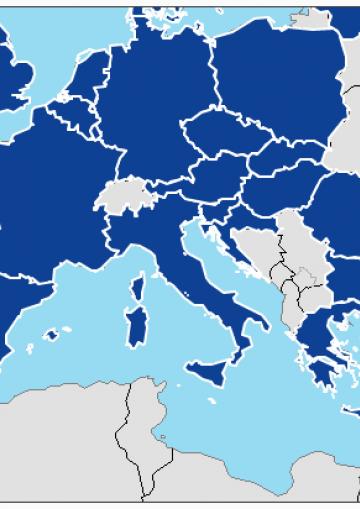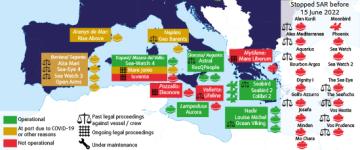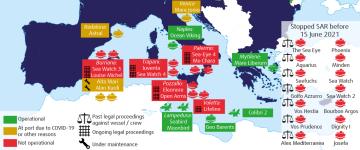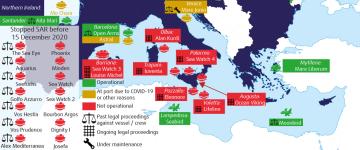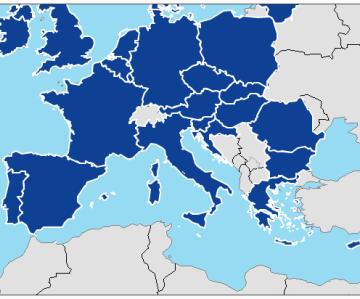To provide a comprehensive overview of the phenomenon, FRA published a note in October 2018 entitled “Fundamental rights considerations: NGO ships involved in search and rescue in the Mediterranean and criminal investigations”. In June 2019, FRA updated the two tables accompanying this note. The overview tables describe criminal and administrative proceedings against non-governmental organisations (NGOs) or other private entities deploying search and rescue (SAR) vessels.
Some ten new criminal and administrative proceedings were initiated since June 2019. The map below shows the state of play of civil society SAR vessels and aircrafts as of 15 June 2020, including those who had to stop their activities, and indicates past and ongoing legal proceedings against the vessels and/or their crew members.
Map showing NGO ships involved in SAR operations in the Mediterranean Sea between 2016 and 15 June 2020
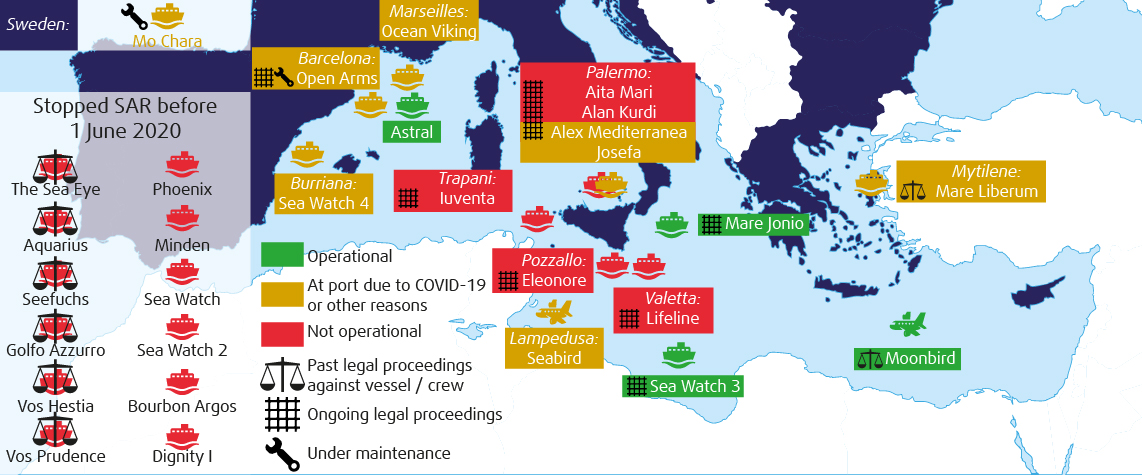
The map shows that due to ongoing criminal proceedings, vessel seizures, and other restrictive measures imposed in response to the outbreak of the COVID-19 pandemic, the majority these assets are blocked in ports without the possibility of carrying out SAR operations. Since the beginning of June 2020, a few vessels have started sailing again (“Sea Watch 3, “Mare Jonio” and “Astral”) following the relaxation of the measures to contain the COVID-19 pandemic. Out of a total of 15 vessels and two reconnaissance aircraft deployed in June 2020, five were held in ports pending legal proceedings (see assets in red) whereas others were stuck in ports due to COVID-19 restrictions or other reasons (see assets in yellow). The map also displays the vessels and/or their crew subject to past or current legal proceedings.
The accompaying two tables incorporate new developments during the past twelve months. Table 1 provides an overview of all NGOs and their vessels and reconnaissance aircraft involved in SAR operations since 2016 in the Mediterranean – also showing whether they have been subject to legal proceedings.
In the past twelve months, three new rescue vessels and one reconnaissance aircraft started operations in the Mediterranean. Since the outbreak of the COVID-19 pandemic and the seizure of the “Aita Mari” and the “Alan Kurdi” vessels in May 2020, however, no NGO rescue vessel was carrying out SAR activities at sea until “Sea Watch 3” resumed operations in early June 2020. This was due to a combination of factors: seizures and/or criminal investigations but also the restrictive measures to protect public health imposed by EU Member States, including the closure of the Italian and Maltese ports considered “unsafe” by the authorities.
Due to the limited NGO rescue capacity, state vessels and commercial or cargo ships intervened in maritime rescue activities. In recent months, rescued people were kept in quarantine on board before landing or in ports right after their disembarkation. In some cases, rescued persons were kept on tourist ships for long periods, some of them for more than one month, thus exceeding the 14 days of quarantine required (for more, see FRA’s latest Quarterly Bulletins on migration-related fundamental rights concerns).
Table 2 provides further details on the ongoing or closed investigations and administrative or criminal proceedings against private entities involved in SAR operations as of June 2020, of which FRA is aware after having reviewed publicly available sources. It shows that over 40 proceedings have been initiated since 2017 by Germany, Greece, Italy, Malta, the Netherlands and Spain. Over ten legal cases were opened since last year, seven of which were in Italy. Among them, a dozen were still pending. Over twenty ended with an acquittal or were discontinued due to the lack of evidence.
In Germany, recent amendments to the shipping security adjustment regulation and the motor boat regulation may render it more complicated for NGO vessels to comply with more stringent security and maintenance requirements when engaging in rescue at sea.
The applicable EU and international legal and policy framework remains unchanged, hence the note's related legal analysis is not reproduced but can be consulted via this link. All information is up-to-date until 15 June 2020.
FRA will continue to closely follow further developments and report on this through its Quarterly Bulletins on migration-related fundamental rights concerns covering 17 selected EU Member States.
Download Table 2 - Legal proceedings in the EU against private entities involved in SAR operations in the Mediterranean Sea (pdf, 59 KB) >>
